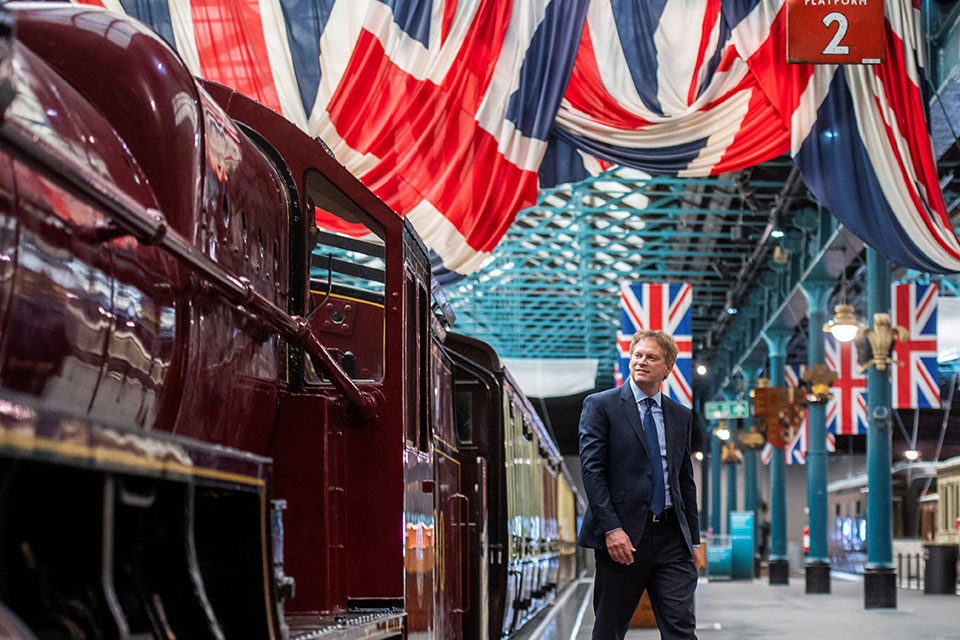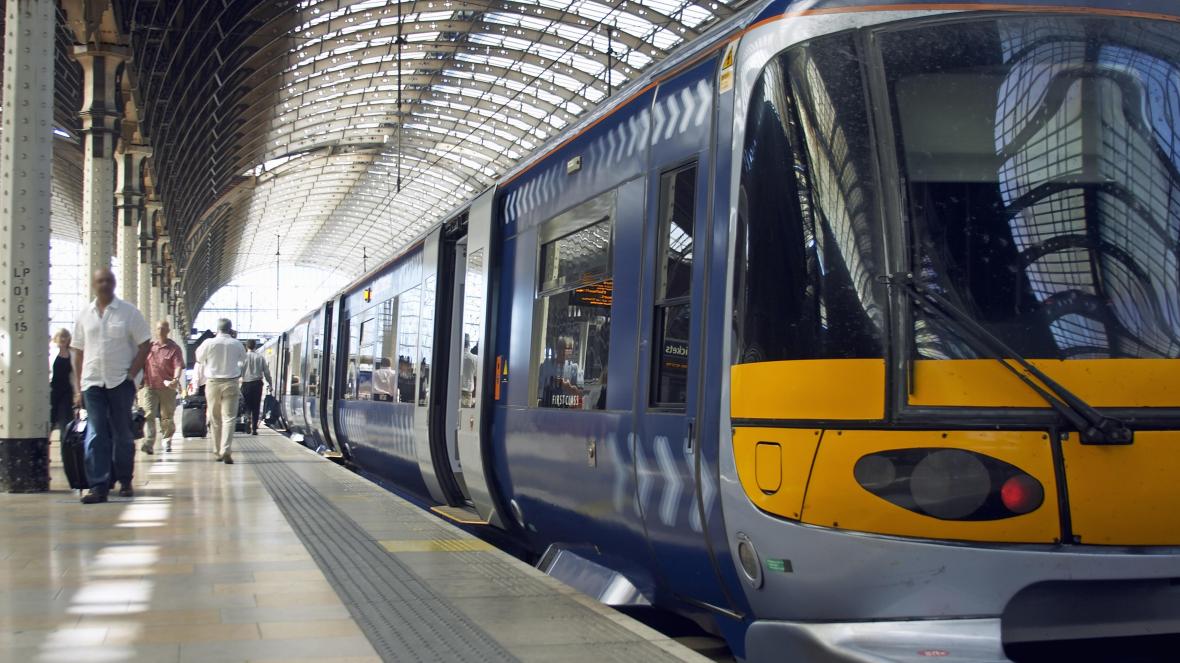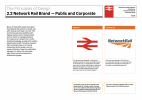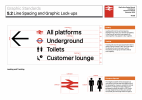Source: https://www.gov.uk/government/news/great-british-railways-for-the-passengerGreat British Railways: for the passenger
New public body Great British Railways to integrate the railways and deliver passenger-focused travel with simpler, modern fares and reliable services.
Department for Transport
A quarter-century of fragmentation on the railways will end as they come under single, accountable national leadership, as the government today (20 May 2021) unveils a new plan for rail that prioritises passengers and freight.
- Williams-Shapps Plan for Rail to reform Britain’s railways and launch a new era for passengers
- biggest change in 25 years sees creation of new public body Great British Railways – a single, familiar brand with united, accountable leadership
- simpler, modern fares delivered, starting with new flexible season tickets on sale from 21 June and a new Great British Railways website for all tickets and clearer compensation
- reforms support delivery of a financially sustainable railway as country recovers from coronavirus (COVID-19), with new contracts focused on punctuality and improved efficiency, making it easier and cheaper to plan maintenance, renewal and upgrades
A new public body, Great British Railways (GBR), will integrate the railways, owning the infrastructure, collecting fare revenue, running and planning the network, and setting most fares and timetables.
GBR will simplify the current mass of confusing tickets with new flexible season tickets and a significant roll-out of more convenient Pay As You Go, contactless and digital ticketing on smartphones. A new GBR website will sell tickets and a single compensation system for operators in England will provide a simple system for passengers to access information and apply for refunds.
There will remain a substantial and often greater role for the private sector. GBRwill contract private partners to operate most trains to the timetables and fares it specifies, with a model similar to that used by Transport for London in its successful Overground and Docklands Light Railway services.
The new Passenger Service Contracts will include strong incentives for operators to run high-quality services and increase passenger numbers. They will not be one-size-fits-all: as demand recovers, operators on some routes, particularly long-distance, will have more commercial freedom. Affordable walk-on fares and season ticket prices will be protected.
The Williams-Shapps Plan for Rail, published today, sets out the path towards a truly passenger-focused railway, underpinned by new contracts that prioritise punctual and reliable services, the rapid delivery of a ticketing revolution, with new flexible and convenient tickets and long-term proposals to build a modern, greener and accessible network.
Prime Minister Boris Johnson said:
I am a great believer in rail, but for too long passengers have not had the level of service they deserve.
By creating Great British Railways and investing in the future of the network, this government will deliver a rail system the country can be proud of.
Grant Shapps Transport Secretary said:
Keith Williams, Chair of the Williams Review, said:Our railways were born and built to serve this country, to forge stronger connections between our communities and provide people with an affordable, reliable and rapid service. Years of fragmentation, confusion and over-complication have seen that vision fade and passengers failed. That complicated and broken system ends today.
The pandemic has seen the government take unprecedented steps to protect services and jobs. It’s now time to kickstart reforms that give the railways solid and stable foundations for the future, unleashing the competitive, innovative and expert abilities of the private sector, and ensuring passengers come first.
Great British Railways marks a new era in the history of our railways. It will become a single familiar brand with a bold new vision for passengers – of punctual services, simpler tickets and a modern and green railway that meets the needs of the nation.
COVID-19 has caused deep, structural challenges to the railway, with use still far below pre-pandemic levels. This strategy re-emphasises our commitment to rail, with tens of billions of pounds invested in more electrification, new and reopened lines and a rail revolution.Our Plan is built around the passenger, with new contracts which prioritise excellent performance and better services, better value fares and creating clear leadership and real accountability when things go wrong.
Our railway history – rich with Victorian pioneers and engineers, steam and coal, industry and ingenuity – demands a bright future. This plan is the path forward, reforming our railways to ensure they work for everyone in this country.
GBR will drive significant efficiencies in the railways’ inflated costs, reducing complexity and duplication, increasing flexibility, changing working practices and making it easier and cheaper to invest. Reform is the only way to protect services and jobs in the long term.
In the short and medium term, we will work closely with the sector on measures to encourage passengers back to rail. To reflect changes in the traditional commute and working life, the government has today announced that a new national flexi season ticket will be on sale this summer, with potential savings of hundreds of pounds a year for 2 and 3 day-a-week commuters. Tickets will be on sale on 21 June, ready for use on 28 June.
The new Passenger Service Contracts will also help to build a more financially stable industry. By removing barriers to new market entrants, including by no longer basing competitions on complex and uncertain revenue forecasts, private operators will be challenged to provide a competitive and customer-focused offer, delivering greater value-for-money for the taxpayer.
Local communities will work closely with GBR on designing services with local leaders given greater control over local ticketing, timetables and stations. The new model will encourage innovative bidders, such as community rail partnerships who want to bid for the GBR contract to operate their local branch lines.
The journey to this new passenger-focused model has begun today. New National Rail Contracts will be announced this year. They will be in operation for 2 years and act as a bridge to reform.
Source: https://www.gov.uk/government/news/...avel-arrives-with-new-flexible-season-tickets#TheFutureIsFlexible: new era of rail travel arrives with new flexible season tickets
New national rail flexible season tickets announced as part of the Williams-Shapps Plan for Rail, the biggest shake-up of rail in a generation.
Department for Transport
A new national flexible rail ticket, matching modern working habits and saving passengers hundreds of pounds, will be available to commuters across England once travel restrictions are lifted.
- 2 and 3 day-a-week commuters given control over their commute and offered potential savings of hundreds of pounds against daily and season tickets
- government’s plans include a new Great British Railways ticket website and app, a retail revolution with simple digital ticketing, contactless pay-as-you-go travel and straightforward compensation
As the government publishes the Williams-Shapps Plan for Rail today (20 May 2021), setting out the path towards a truly passenger-focused railway, Transport Secretary Grant Shapps has announced that “the future is flexible”.
The new flexible ticket will be on-sale on 21 June, for use by 28 June.
The paperless tickets will allow travel on any 8 days in a 28-day period, with passengers able to tap smartcards or scan mobiles at the station, with no need to select the days of travel in advance.
The change has the potential to save commuters hundreds of pounds, providing greater choice and flexibility.
Grant Shapps Transport Secretary said:
For many, the idea of travelling 5 days a week to the office is fast becoming a relic of the past.
The future is flexible: passengers want a simple, stress-free option, and new flexible tickets make fares fairer.
As we kickstart the biggest reform of our railways in a generation, we’re committed to creating a modern railway that works for its passengers.
Exact details of savings will be provided before tickets go on sale. However, analysis shows that 2 day-a-week commuters buying multiple new flexible season tickets could save the following in a year when compared to the cost of daily tickets:
Three day-a-week commuters could save:
- over £250 from Woking to London
- over £200 from York to Leeds
- over £60 from Southampton Central to Winchester
- over £160 from Stafford to Birmingham
- over £220 from Liverpool to Manchester
This new national offer also reflects the long-term decline in the use of traditional season tickets, with a change in working practices having been accelerated by the outbreak of COVID-19.
- over £220 from St Albans City to London
- over £120 from Bromsgrove to Birmingham
- over £90 from Weston-Super-Mare to Bristol Temple Meads
- over £330 from Chelmsford to Stratford
With the pandemic sweeping away the traditional commute and leading to a significant increase in home-working, this ticket reflects the new priorities of the public.
Flexible season tickets and greater discounts are just one of a package of measures to reform the railways to put passengers first. The government has also announced today it will explore new ‘design and ride’ standards to eradicate ‘ironing-board seating’, and efforts to ensure fewer repetitious and annoying pre-recorded announcements.
See also Great British Railways: for the passenger press notice, 20 May 2021
The Williams-Shapps Plan for Rail:
Source: https://www.gov.uk/government/publications/great-british-railways-williams-shapps-plan-for-railGreat British Railways
The Williams-Shapps Plan for Rail
Presented to Parliament
by the Secretary of State for Transport by Command of Her Majesty
May 2021
We want our trains to run on time. This is our plan to do that, and to deliver a wider change on our railways that has never been needed more. The chaotic timetable changes three years ago showed all too clearly that the old ways were not working. Then in March 2020, this Review conceived after those problems and the failure of the East Coast franchise, found itself dealing with something far bigger: the almost total collapse of passenger demand initially, and a profound challenge to the sector's operating model as a consequence of the COVID-19 pandemic.
Before the pandemic, commuters made up 47% of all rail passengers, a further 10% were travelling for business meetings and 5% were shopping. In other words, around two thirds of passengers were using the railways for purposes that now face potentially permanent change.
Much of the old demand will return. Millions of us, imprisoned in front of flickering screens, yearn for human contact. Employers and businesses know that creativity, collaboration, and deal-making are best done in person. Rail freight was heavily impacted at first but has recovered rapidly, demonstrating its agility. But commuting and business travel may never be quite the same again.
This government profoundly believes in the future of the railways. Without them, our cities could not function, critical freight connections would be cut off, carbon emissions and pollution would rise, and mobility would fall – not just for the millions of people without cars, but for drivers too, as the roads became clogged. We have proved our commitment: the amount we have paid to keep services going during the pandemic is now around £12 billion. We have proved it by pressing ahead with High Speed 2 (HS2), improvements across the north of England, the new Oxford-Cambridge line and our programme of reversing the Beeching closures. This white paper makes further commitments, including a modern, improved experience for both freight customers and passengers and zero carbon trains. We are growing the network, not shrinking it.
But the current sums being paid to operate and maintain the railways are not sustainable. To truly secure rail’s future, there must be radical change. The railways lack a guiding focus on customers, coherent leadership and strategic direction. They are too fragmented, too complicated, and too expensive to run. Innovation is diffcult. Incentives are often perverse. Some working practices have not changed in decades. There must be single-minded efforts to get passengers back. In short, we need somebody in charge.
That is why we now propose the biggest change to the railways in 25 years, ending the fragmentation of the past and bringing the network under single national leadership. A new public body, Great British Railways, will own the infrastructure, receive the fare revenue, run and plan the network and set most fares and timetables. Network Rail, the current infrastructure owner, will be absorbed into this new organisation, as will many functions from the Rail Delivery Group and Department for Transport.
There will be a new brand and identity for the whole system, built upon the double arrow, with national and regional sub-identities. Great British Railways will simplify the current confusing mass of tickets, standardising mobile and online ticketing, and bringing an end to the need to queue for paper tickets. Affordable 'turn up and go' fares and capped season tickets will continue to be protected. New products, such as flexible season tickets aimed at those commuting for two or three days a week, will be introduced to reflect new working and travel patterns. Trains will be better co- ordinated with other forms of transport, such as buses and bikes.
Private sector innovation has helped deliver the spectacular growth the railways have seen in the last quarter-century; it is essential that we keep the best of this and encourage more, particularly in IT, data and modern payments. In most cases Great British Railways will contract with private companies to operate trains to the timetable and fares it specifies, in a way similar to that used by Transport for London (TfL) on its successful Overground and bus networks. Operators will compete for the contracts, and we expect competition to be far greater than for the old franchises, with simpler procurement, lower costs and no one-size-fits-all approach. Freight and open access operators will be supported by national co-ordination and new safeguards.
Franchising will be replaced by Passenger Service Contracts, a new approach that will include strong incentives for operators to run safe, high-quality, punctual services, manage costs, attract more passengers and innovate. Where and when it represents value for money and is financially sustainable, operators will have more commercial freedom, particularly on long-distance routes.
Great British Railways, too, must be a new organisation, with a new culture and customer focus, definitely not just a bigger version of Network Rail. Just as with operators, it will be incentivised to improve customer service, maintain a safe network and attract new passengers. It will have a completely new role, with specific responsibilities to its passenger and freight customers and a clear remit to reform the can’t-do culture and inflated costs that exist across the sector. The new body will recruit more broadly than before – including people with experience in sectors with a strong focus on customers. Great British Railways will be accountable to Ministers in a similar way that TfL is to the Mayor of London.
Great British Railways will secure significant efficiencies. Today’s railways are a maze of agreements between hundreds of different parties, drawn up and policed by battalions of lawyers and consultants, including an entire staff dedicated to arguing about who is at fault for each delayed train. Change is slow and comes by painstaking negotiation. In the new world, that cannot work. Under single national leadership, our railways will be more agile: able to react quicker, spot opportunities, make common- sense choices, and use the kind of operational flexibilities normal in most organisations, but difficult or impossible in the current contractual spider’s web.
A simpler, more integrated structure will cut duplication, increase Great British Railways’ purchasing power and economies of scale, and make it easier and cheaper to plan maintenance, renewals and upgrades. These and other efficiencies will take time to bear fruit, but after five years it is expected that they could be saving around £1.5 billion a year, equivalent to 15% of the network’s pre-pandemic fares income.
Great British Railways will be better able to respond quickly to changing demand and lead the railways through the challenges of the post-pandemic world. It seems likely, for instance, that the old pre-9am peaks in demand around our biggest cities will fatten or spread more through the day; and that leisure travel will increase as a share of the whole. Less frequent but longer commutes may become more common. That may mean different service patterns, and changing train interiors to focus on comfort rather than capacity.
It will definitely mean a new focus on the escalations in cost, gold- plating and over-specification that have occurred since privatisation. And it will definitely need a change of mindset from everybody at
all levels, from Ministers, unions and regulators to traincrew and managers. Under this model, the sector will provide fulfilling, high- skilled, flexible and modern career opportunities that attract and support the brightest and the best to flourish, so that the railways’ people also benefit from this new golden era for the railways.
As the Review has been undertaken collaboratively, it has been possible to move quickly to change policy even whilst its work progressed. We have started some of the structural changes already. In September 2020, we called time on franchising. Our Emergency Recovery Measures Agreements, made to support the network in the pandemic, include new obligations to co- operate. Everyone across the whole sector will need to work together to help our railways win back passengers, attract new freight customers and maintain their custom going forward.
In 1825, this country invented something that spread its iron web across the earth and transformed everywhere it touched. It was, of course, the railway. By the time we celebrate the bicentenary, four years from now, we want this plan to have secured our magnificent network for decades more.
The Rt Hon Grant Shapps
Secretary of State for Transport
MP Keith Williams
Chair, Williams Rail Review
Original post below:
Flexible fares and pay-as-you-go travel under radical rail reforms
May 14 2021, 12.00am BST

Operation of train and tracks will be brought under the control of a new body
GETTY IMAGES
Under the reforms, operation of the trains and tracks will be brought under the control of one new organisation — independent from the Department for Transport — to combat criticism that the existing system is too fragmented.
The state-owned Network Rail, which is responsible for operating and maintaining 20,000 miles of tracks, signals and tunnels, will eventually be rolled into the new arms-length body.
It will also have greater control over more than 20 privately run train companies that operate intercity and commuter services across the country.
Powers will include forcing through amendments to the timetable to space out services and prevent unnecessary duplication on routes such as the east coast mainline, where multiple operators compete for the same passengers.
Crucially, the body will also be tasked with specifying new London-Overground-style “concession” agreements for each operator that will provide financial incentives for running services on time while penalising poor performance and dirty carriages.
Most of the reforms will be phased in over several years. However, in a series of “quick wins”, the government will also spell out more immediate changes designed to attract passengers back to the railway after the collapse in demand during the pandemic.
Companies will be told to introduce flexible season tickets that can be used on two or three days a week — rather than the costlier seven-day passes — to appeal to the increased numbers of people working from home for part of the week. It is understood that they will be introduced after the summer.
Ministers will also pledge to introducing contactless pay-as-you-go train travel in all towns and cities, and require operators to compensate passengers for delays of 15 minutes, a system already introduced by most companies.
Further measures include a renewed commitment to electrify lines in the north of England to allow quicker and more punctual trains to operate, ending the reliance on older diesels.
However, The Times understands that ministers will resist a more radical reform of Britain’s fiendishly complicated rail fares system, which allows up to 55 million different fare combinations to be sold at any one time. The Treasury is said to be concerned by the possible impact on the taxpayer.
The white paper will be modelled on a long-awaited report from Keith Williams, the former chief executive of British Airways, who was commissioned to lead an overhaul of the railways in 2018.
It was ordered after the timetabling fiasco in May of that year, when the introduction of new schedules led to the meltdown of services in the north and southeast of England. An inquiry blamed collective failure, including poor preparation by train companies, late infrastructure work by Network Rail, and lack of oversight by the Department for Transport.
It exposed inefficiencies dating back to the break-up of British Rail in 1993, when train operation passed to multiple companies and the infrastructure was handed to Railtrack and latterly Network Rail. The white paper will bring control back under one organisation, although private companies will continue to run trains.
The report’s planned release in autumn 2019 was delayed by the general election and the pandemic.
ANALYSIS
It’s almost 30 years since British Rail hit the buffers (Graeme Paton writes). Privatisation of the railway was seen as the cure to the ills of state-owned BR (British Rail): chronic underinvestment, rapidly ageing infrastructure and a long-term decline in passenger demand.
To its supporters, privatisation was a success. The break-up of train operations into multiple private companies brought innovation, investment and full carriages. Since the mid-90s, passenger numbers have risen by about 4 per cent a year — and before the pandemic the number of people travelling by train was back to levels last seen in the early 1920s.
Rising passenger numbers largely paid for the day-to-day operations, and the government paid about £7 billion a year towards upgrading old infrastructure, which stayed in state hands under Network Rail.
In recent years, however, the system has buckled. The franchise system — contracts handed to train companies to run individual routes for up to a decade — has become unwieldy and bureaucratic as politicians and civil servants make ever more elaborate contractual demands. Overcrowding and delays have soared as upgrades have failed to keep pace with growing demand.
After the mid-2018 timetabling chaos, an inquiry blamed the fragmented system, poor planning by train companies, delayed work by Network Rail and chaotic leadership by the Department for Transport (DfT). The government’s reforms will seek to address this by scrapping franchises and, crucially, bringing track and train back together under one new body with day-to-day independence from the DfT. Though it falls short of full renationalisation, it signals radical change for the railway.
Source: https://www.thetimes.co.uk/article/...o-travel-under-radical-rail-reforms-sl0v25qzf
Last edited:



